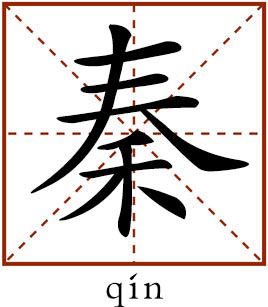Qin

This character usually refers to the dynasty that established the first great Chinese empire, the Qin Dynasty (221–207 BCE). It is also used as a surname.
伤心秦汉经行处
shāng xīn qín hàn jīng xíng chù
Shang xin means "to feel sad." Qin Han refers to the Qin Dynasty (221–207 BCE) and the Western Han Dynasty (206 BCE–220 CE). Jing xing chu refers to the place the narrator passes by. This term, taken literally, means "It breaks my heart to come to the old places of Qin and Han.
This is a line from a poem by Zhang Yanghao (1270–1329), a great writer of sanqu (a fixed-rhythm form of Classical Chinese poetry). This sanqu-style poem, titled "Meditation on the Past at Tong Pass," is said to be composed by Zhang, in his late years, on the way to present-day Shaanxi Province for famine relief as a court official. After witnessing the way people struggled from famine caused by drought, Zhang wrote this poem: "Peaks and ridges mass together/ River breakers blast in wrath/ In and out through river and hill/ Goes the road through old Tong Pass/ I gaze at the western capital/ All my thought distraught/ This is the place that breaks the heart/ Where Han and Qin marched past/ Palaces and towers and halls/ All turned dirt at last/ Dynasties rise/ The people suffer/ Dynasties fall/ The people suffer" (trans. A.Z. Foreman).
Mediation on the past is an old poetic tradition in China. This piece stands out as one of the most famous sanqu-style poems. The capitals of the Qin and the Western Han were located to the west of the Tong Pass. Zhang saw the remains of the palaces, which once thrived, reduced to ruins. These structures were built at high cost in human lives. Countless ordinary people were forced to work as laborers, and many of them died building these palaces. This is why Zhang sighed mournfully in the four concluding lines, which are also the most powerful and unforgettable lines in this poem. Each of the two lines—"Dynasties rise" and "Dynasties fall"—is followed by the same refrain: “The people suffer.” This was where the great sorrow of the poet came from—whatever the case, the people always suffer.
Edited by REN GUANHONG
